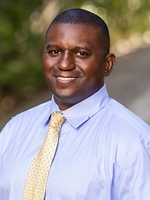Kevin C. McGill, MD, MPH, RMSK, MRMD Spotlight

October 7, 2021
Kevin C. McGill MD, MPH, RMSK, MRMD assistant professor and Director of Musculoskeletal Interventions in the musculoskeletal imaging section, has proven that focusing on professionalism and patient care can lead to career advancement.
Dr. McGill was born in New York and grew up in the Bronx, in a neighborhood, rich with Jamaican culture and people. Streets were lined with a variety of Caribbean restaurants inspiring all who walked by to come feast. He recalls, “My bedroom was at the same level as the subway about 100 yards away. The noise never really bothered me but I did notice when it wasn’t there”. Weekends were the best. The air was full of flavor, music, and opportunities. “I remember waking up to the aroma of Jamaican bakeries preparing hard dough bread and listing to reggae music throughout the day.”
During his teen years, a typical Monday through Sunday for Dr. McGill was busy. He played sports, participated in multiple clubs, and worked odd jobs on weekends. He also did volunteer work at multiple organizations including Habitat for Humanity.
Dr. McGill’s afterschool and weekend work included building maintenance, landscaping, drywall, and painting. His least favorite was tarring roofs. “It’s horrible!” he exclaims. “Check out the show Dirty Jobs (Season 2, Episode 1) for a reference.”
Hard work and perseverance resulted in admission to Yale University where he earned a bachelor’s degree in biomedical engineering – and a master’s degree in public health. After beginning his career as a hospital administrator, he decided to transition to medical school at a time when many of his colleagues and friends were either doctors or already in medical school. “Their work involving direct-patient care inspired me to reapproach my contribution in advancing public health,” he says. “I decided to leave my job as a hospital administrator and start my work in clinical medicine.”
He continued volunteer work throughout medical school, working with a Black men’s health clinic, Project Brotherhood, in Chicago and going on a volunteer medical trip to a developing area of Jamaica. As a radiology resident, he worked with Rad-Aid International, eventually travelling to Nicaragua to help improve access to medical imaging and radiology resources.
Upon completing his radiology residency and fellowship in musculoskeletal imaging at Henry Ford Health System he was offered a position as a musculoskeletal radiologist at the University of California San Francisco.
Dr. McGill’s main function as a musculoskeletal radiologist is to interpret CT, US, MRI, and DEXA studies related to the musculoskeletal system as well as perform image guided procedures such as joint injections/aspirations, soft tissue/bone biopsies, and sclerotherapy.
Building a program to perform ultrasound guided musculoskeletal biopsies has been a priority for Dr. McGill who considers image-guided biopsies a rewarding aspect of his practice: “These minimally invasive procedures are an important component of care for cancer patients that enable swift and accurate diagnosis of suspicious lesions with minimal risk.” While this was an uncommon procedure for the musculoskeletal radiologists prior to his arrival, now the majority of tumor biopsies in the musculoskeletal section are performed under ultrasound guidance.
Recognizing the layers of emotion, stress, and physical demands patients endure during diagnostic and therapeutic procedures, Dr. McGill does what he can to reduce these feelings. “Patients awaiting cancer results arrive nervous, scared, and emotional.
I often communicate with referring providers and patients before and after the procedure to ultimately create a less stressful atmosphere and improve the likelihood of a successful procedure.”
Since joining UCSF, Dr. McGill has become active in multiple professional organizations, including Radiological Society of North America, American Roentgen Ray Society, International Skeletal Society, and Society of Skeletal Radiology committees. He also works with the Alliance for Physician Certification and Advancement (APCA) to write questions for their musculoskeletal ultrasound certification exam.
UCSF’s vision in providing dedicated access and equity in medical education to achieve more equitable healthcare is strongly supported by Dr. McGill through involvement in the Radiology Diversity Committee and URM Community Dinners. He is also involved on a national level as part of the RSNA Committee on Diversity, Equity, and Inclusion/Professionalism Working Group. Late last year he invited Sunny Nakae, PhD, MSW, Sr. Assoc. Dean & Associate Professor of Medical Education, to give a well-received Grand Rounds with a focus on biases in virtual interviewing – Bias Breaks for Residency Admissions Committees. Dr. Nakae’s aim is to build capacity for justice in medicine and society through transformative leadership, practice, allyship, co-investment, and antiracism.
With equally busy schedules it was by chance that surgeon Melissa Zimel, MD, and Dr. McGill met in medical school. A few years later they were married and now have two wonderful children. “Do your best to support each other,” advises Dr. McGill. “The responsibilities of patient care, teaching, advancing medicine, and community building are simultaneously rewarding and exhausting. With clinic, cases, surgeries, tumor boards, and teaching our schedules can be hectic and are often unpredictable.”
Outside of work, the McGill family time involves a variety of outdoor activities including walking to the beach and hiking coastal trails.
When asked for his best career advice, Dr. McGill offered these parting words:
“Be respectful, flexible, and always keep improving. My practice is different than I expected. Being flexible has opened new opportunities for me.” He is looking forward to working with colleagues throughout UCSF and other institutions to continue developing the programs for musculoskeletal ultrasound as well as the minimally invasive detection and treatment of musculoskeletal tumors.
By L. Delgado
